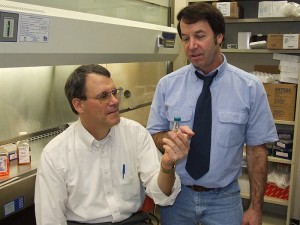
Research by Health Center scientists suggests that a common oral bacterium may exacerbate autoimmune disease. The findings of Dr. Robert B. Clark, associate professor of immunology, and Dr. Frank Nichols, professor of periodontology, are published in the December 2009 issue of The American Journal of Pathology.
Multiple sclerosis (MS), a disease where the immune system attacks the brain and spinal cord, affects nearly 1 in 700 people in the United States. Patients with multiple sclerosis have a variety of neurological symptoms, including muscle weakness, difficulty in moving, and difficulty in speech.
Porphyromas gingivalis, a common oral bacterium in humans, produces a unique type of lipid, phosphorylated dihydroceramides (DHCs), which enhance inflammatory responses. These lipids are also likely produced by bacteria found in other parts of the body including the gastrointestinal tract. To determine whether these lipids accentuate immune-mediated damage in autoimmune disease, the researchers administered phosphorylated DHCs in a mouse model of MS. The severity of disease was significantly enhanced by the addition of these lipids in a manner that was dependent on activation of the immune system. These data suggest that phosphorylated DHCs from bacteria commonly found in humans may trigger or increase the severity of autoimmune diseases such as multiple sclerosis.
“While it is clear that the immune system in most individuals has the potential to attack self-tissues, the ‘tipping’ factors that initiate and propagate autoimmune diseases such as multiple sclerosis in only a subset of individuals remain unknown,” says Clark. “Overall, our results represent the first description that DHCs derived from common human bacteria are capable of enhancing autoimmune disease.” Thus, these lipids may function as “tipping” factors, playing a previously unrecognized role in initiating or exacerbating human autoimmune diseases.
In future studies, Clark and Nichols plan to characterize the effects of phosphorylated DHCs on specific cells of the immune system and to identify how and where these lipids are deposited in tissues throughout the body. In addition to the role of these lipids in triggering and worsening MS, the authors believe that DHCs may have the potential to serve both as new markers of MS disease activity and as new targets for therapeutic intervention.


